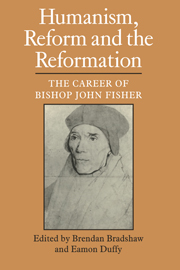Book contents
- Frontmatter
- Contents
- Preface
- List of abbreviations
- Bishop John Fisher, 1469–1535: the man and his work
- John Fisher and the promotion of learning
- The University chancellor
- The bishop in his diocese
- Fisher and Erasmus
- Fisher and More: a note
- The polemical theologian
- Fisher's view of the Church
- Fisher, Henry VIII and the Reformation crisis
- Royal ecclesiastical supremacy
- The spirituality of John Fisher
- Appendixes
- Index
Fisher and More: a note
Published online by Cambridge University Press: 04 August 2010
- Frontmatter
- Contents
- Preface
- List of abbreviations
- Bishop John Fisher, 1469–1535: the man and his work
- John Fisher and the promotion of learning
- The University chancellor
- The bishop in his diocese
- Fisher and Erasmus
- Fisher and More: a note
- The polemical theologian
- Fisher's view of the Church
- Fisher, Henry VIII and the Reformation crisis
- Royal ecclesiastical supremacy
- The spirituality of John Fisher
- Appendixes
- Index
Summary
To make it clear at once that the portraits in my diptych are not of spiritual twins, let me begin with an impression of clash between More the apologist and Fisher the preacher. You remember that a nameless ‘Messenger’ is More's guest and interlocutor in A Dialogue Concerning Heresies. In a long passage added to the second edition (1531), the young man exploits ‘a proper boke & a very contemplatyue … entytled ye image of loue ’The good holy man’ who wrote it is nostalgic, he says, for the good ‘olde tyme’ when ‘they had trene chalyces and golden prestes / and nowe haue we golden chalyces and trene prestes’. More takes issue with the ‘feruent vndyscrete’ of The Image of Love, and specifically with that ‘proper’, that is clever, comparison between golden and wooden, antiquity and today: ‘I thynk he sayth not trouth / that the chalyces were made of trene when the prestes were made of golde.’ The Yale editors remind us that the comparison was not new, as More must have known. It is found in Savonarola's best-seller De Simplicitate Christianae vitae and in Gratian's Decretum – a handbook of More's in his legal training; it was even ascribed to the eighth-century West Saxon missionary St Boniface.
A nearer precedent was Fisher. He uses another version of the antithesis in a sermon which many of More's readers must have read, since The Fruitful Sayings of David had gone through at least eight editions over the previous two decades.
- Type
- Chapter
- Information
- Humanism, Reform and the ReformationThe Career of Bishop John Fisher, pp. 103 - 108Publisher: Cambridge University PressPrint publication year: 1989
- 1
- Cited by

